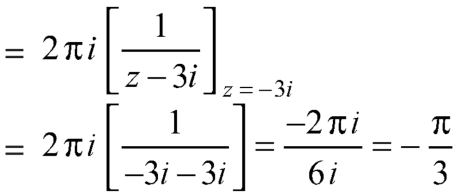Unit-5
Complex Variable –Integration
Q1: Evaluate  where c is the circle with center a and r.
where c is the circle with center a and r.
What is n = -1.
A1.
The equation of a circle C is |z - a| = r or z – a = 
Where  varies from 0 to 2π
varies from 0 to 2π
dz = 




Which is the required value.
When n = -1

Q2: Evaluate  where C is |z + 3i| = 2
where C is |z + 3i| = 2
A2.
Here we have-

Hence the poles of f(z),

Note- put determine equal to zero to find the poles.

Here pole z = -3i lies in the given circle C.
So that-


Q3: Explain the following by cauchy’s integral method:

A4ution:
Given,


= 
= 
= 
Q4: Evaluate  by using Cauchy’s integral formula.
by using Cauchy’s integral formula.
Here c is the circle |z - 2| = 1/2
A5. it is given that-

Find its poles by equating denominator equals to zero.



There is one pole inside the circle, z = 2,
So that-


Now by using Cauchy’s integral formula, we get-

Q5: Evaluate the integral given below by using Cauchy’s integral formula-

A6. Here we have-

Find its poles by equating denominator equals to zero.

We get-

There are two poles in the circle-
Z = 0 and z = 1
So that-

Q6: Expand sin z in a Taylor’s series about z = 0.
A7.
It is given that-

Now-




We know that, Taylor’s series-

So that


Hence

Q7: Find the Laurent’s expansion of-

In the region 1 < z + 1< 3.
A8.
Let z + 1 = u, we get-




Here since 1 < u < 3 or 1/u < 1 and u/3 < 1,
Now expanding by Binomial theorem-


Hence

Which is valid in the region 1 < z + 1 < 3
Q8: Determine the poles of the function-

A9.
Here we have-

We find the poles by putting the denominator of the function equals to zero-
We get-


By De Moivre’s theorem-


If n = 0, then pole-

If n = 1, then pole-

If n = 2, then pole-

If n = 3, then pole-

Q9: Evaluate  .
.
A10.
Here put 
Then-

Where C is the circle |z| = 1
The pole of the integrand are the roots of  which are-
which are-

Out of the two poles, here z  lies inside the circle C.
lies inside the circle C.
Residue at z  is-
is-


By residue theorem-

So that-

Q10: Evaluate  where a > |b|.
where a > |b|.
A11.
As we know that-

So that-

Or

Now on putting  , we have-
, we have-

Where c is the circle |z| = 1.
Residue at z =  is-
is-

By residue theorem-

Hence-
